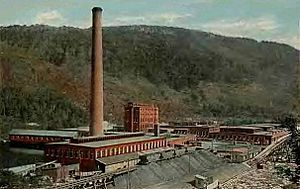Cascade, New Hampshire facts for kids
Quick facts for kids
Cascade, New Hampshire
|
|
|---|---|

Cascade Mill c. 1920
|
|
| Country | United States |
| State | New Hampshire |
| County | Coos |
| City | Berlin |
| Town | Gorham |
| Elevation | 1,047 ft (319 m) |
| Time zone | UTC-5 (Eastern (EST)) |
| • Summer (DST) | UTC-4 (EDT) |
| Area code(s) | 603 |
| GNIS feature ID | 871636 |
Cascade is a small community in New Hampshire, United States. It's not a city or town on its own, but it's part of both the city of Berlin and the town of Gorham, New Hampshire.
The community gets its name from a beautiful waterfall nearby, which you can see in the hills to the east. Cascade is located along New Hampshire Route 16, which is the main road leading into Berlin from the south. On one side of the road, there's a paper mill located near the Androscoggin River. This flat area is known as "Cascade Flats." On the other side, there's a hill called "Cascade Hill."
History
Early Days and the Mill
Long ago, in the mid-1800s, many people visited the area because they loved the beauty of the Alpine Cascades waterfall. Back then, visitors could reach the waterfalls by crossing a small wire bridge and following a trail through a peaceful grove of trees.
Later, in 1904, a big project began: the construction of the Cascade Mill. This mill was built by a company called the Brown Company. Many immigrants from Italy and Poland came to help build the mill. After their hard work, they often settled down and made Cascade their new home.
The Cascade Mill played an important role in making paper. Unfinished paper products from another mill in Berlin were brought here. Trains, specifically two GE 70-ton locomotives, helped transport these materials. At the Cascade Mill, the paper was finished and made ready for use. Today, this mill is known as Gorham Paper and Tissue.
Ancient Discoveries
In 1988, something very exciting was found in Cascade. Archaeologists, who are like history detectives, discovered four prehistoric sites. These sites were on the east side of the Androscoggin River, in an area called Pulsifer Rips, which is a two-mile stretch of the river below the Cascade Dam. These discoveries included the remains of an ancient village and places where stone tools were made. This shows that people lived in this area a very long time ago!
Image gallery
 | Mary Eliza Mahoney |
 | Susie King Taylor |
 | Ida Gray |
 | Eliza Ann Grier |





